Abstract
Evidence is accumulating that the tumour-suppressor gene p53 is involved in the development of bladder cancer. Therefore we studied p53 mutations in 47 bladder cancers obtained from 45 patients using polymerase chain reaction-single-strand conformation polymorphism (PCR-SSCP) analysis. Eight out of 24 invasive tumours appeared to have a p53 mutation, while no p53 mutations were found in the superficial tumours. All the p53 mutations were found in grade 3 tumours. The tumours with altered p53 showed a higher frequency of allelic loss (FAL) than the tumours without a mutation (55.8% vs 21.1%, P < 0.05, chi 2 test). This increase in FAL suggests a correlation between p53 mutations and genetic instability. A significant correlation between mutated p53 and poor survival in the whole group studied was found (P < 0.001, log-rank test). However, within the group of muscle-invasive tumours the occurrence of p53 mutations had no additional prognostic value. Therefore, even though p53 mutations were found in aggressive tumours, the clinical usefulness of its detection seems limited. Nevertheless, these results imply that p53 is involved in the clinical behaviour of bladder cancer; its role in the progression of superficial cancer to invasive disease merits further attention.
Full text
PDF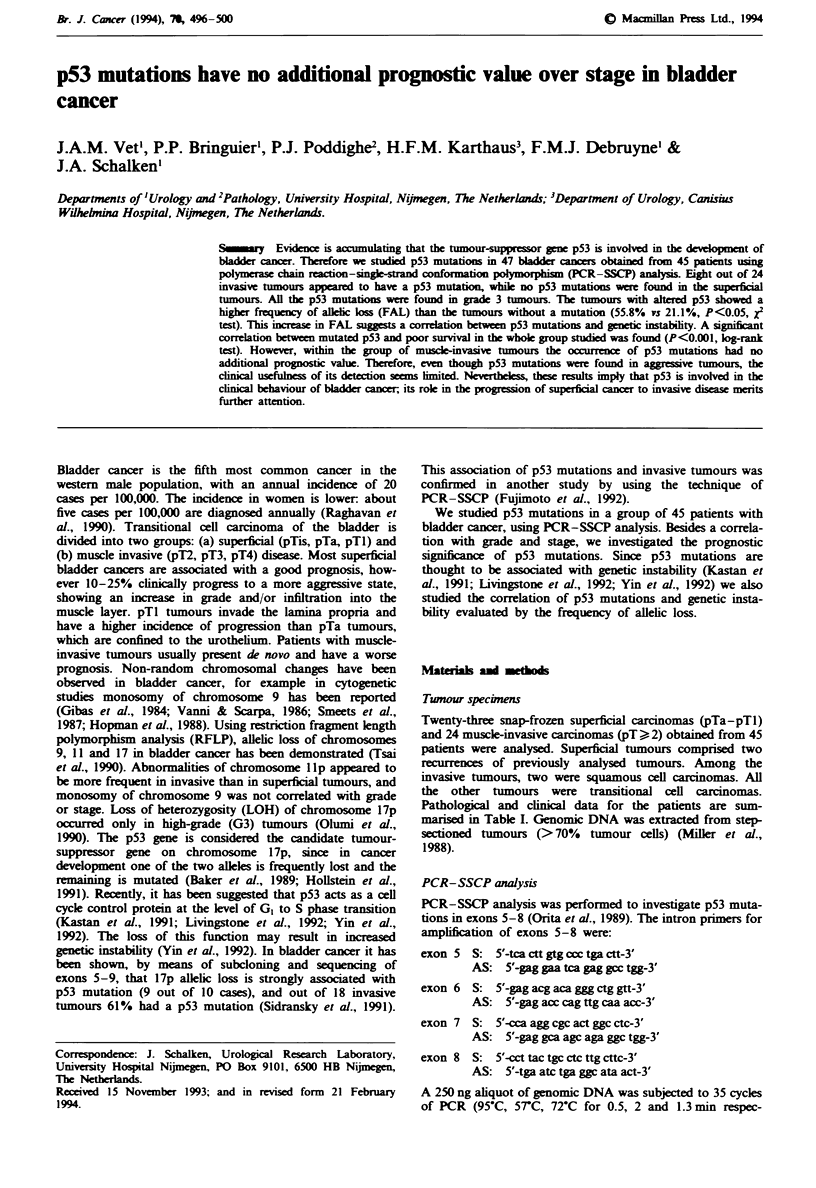
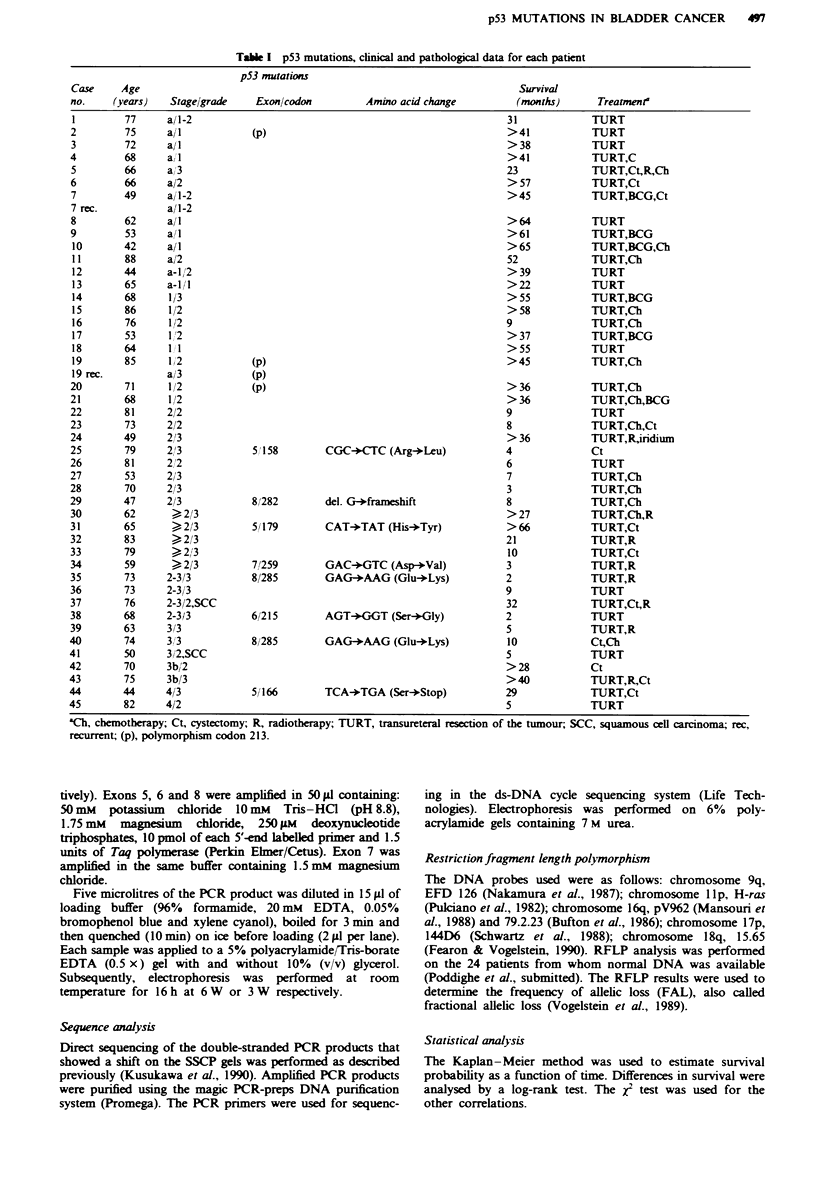
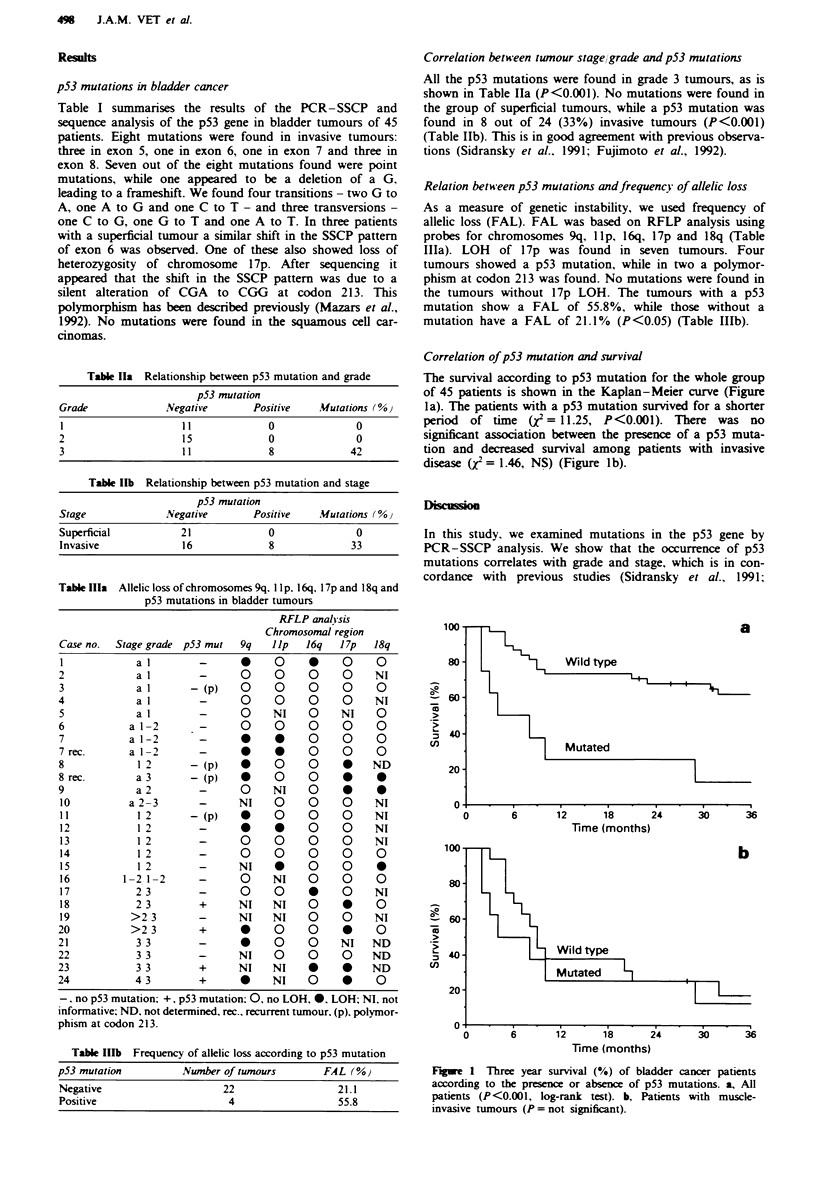
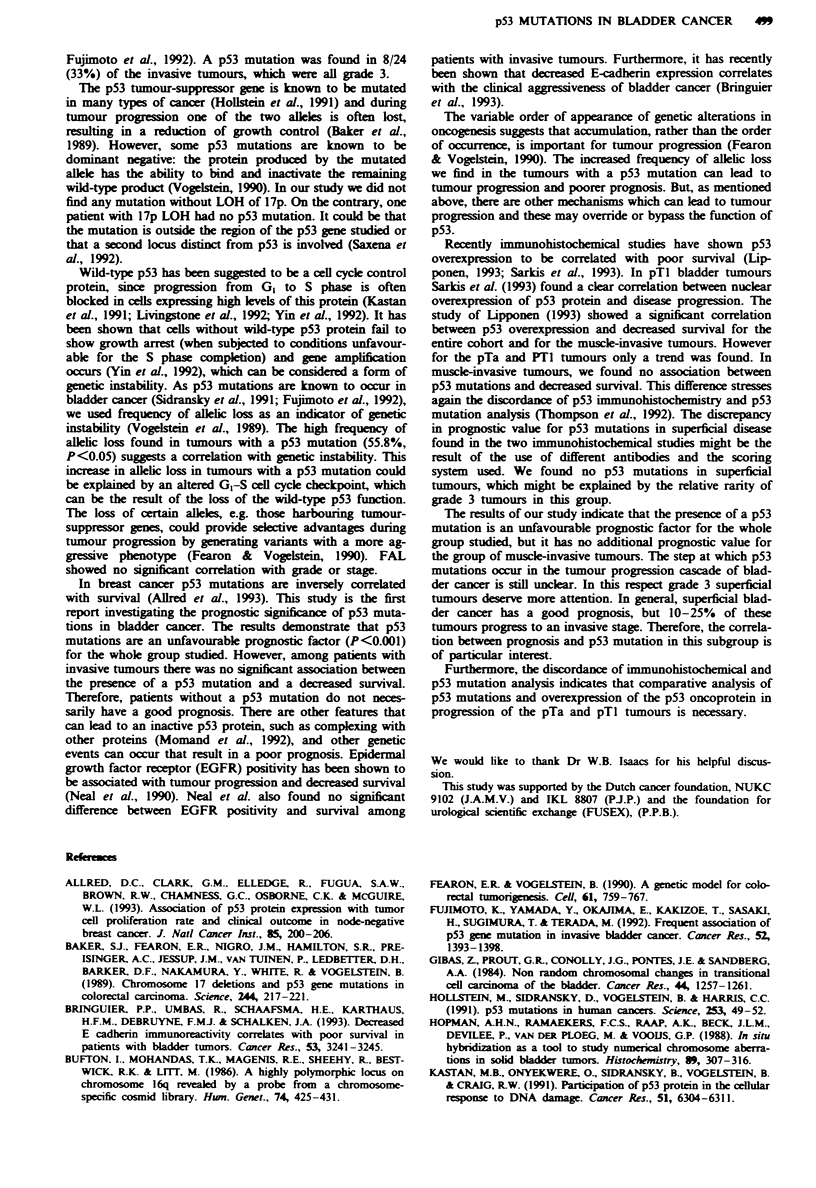
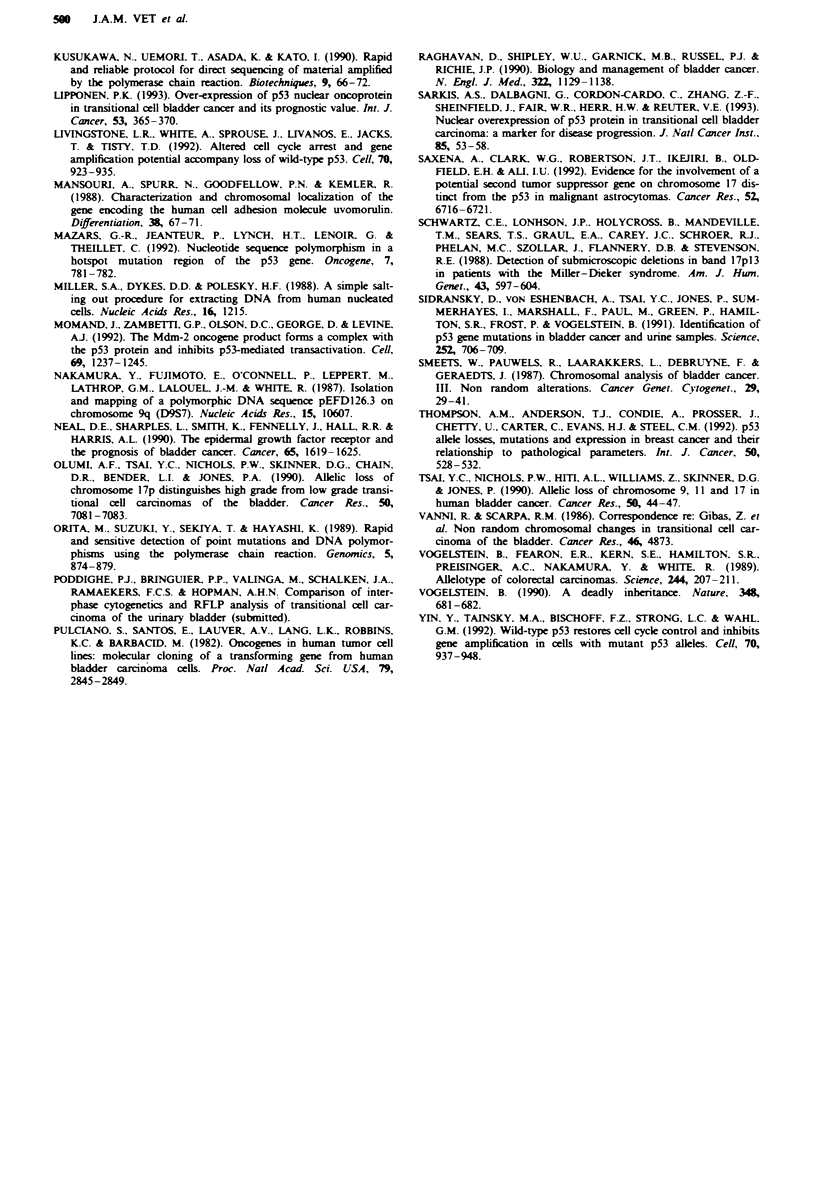
Selected References
These references are in PubMed. This may not be the complete list of references from this article.
- Allred D. C., Clark G. M., Elledge R., Fuqua S. A., Brown R. W., Chamness G. C., Osborne C. K., McGuire W. L. Association of p53 protein expression with tumor cell proliferation rate and clinical outcome in node-negative breast cancer. J Natl Cancer Inst. 1993 Feb 3;85(3):200–206. doi: 10.1093/jnci/85.3.200. [DOI] [PubMed] [Google Scholar]
- Baker S. J., Fearon E. R., Nigro J. M., Hamilton S. R., Preisinger A. C., Jessup J. M., vanTuinen P., Ledbetter D. H., Barker D. F., Nakamura Y. Chromosome 17 deletions and p53 gene mutations in colorectal carcinomas. Science. 1989 Apr 14;244(4901):217–221. doi: 10.1126/science.2649981. [DOI] [PubMed] [Google Scholar]
- Bringuier P. P., Umbas R., Schaafsma H. E., Karthaus H. F., Debruyne F. M., Schalken J. A. Decreased E-cadherin immunoreactivity correlates with poor survival in patients with bladder tumors. Cancer Res. 1993 Jul 15;53(14):3241–3245. [PubMed] [Google Scholar]
- Bufton L., Mohandas T. K., Magenis R. E., Sheehy R., Bestwick R. K., Litt M. A highly polymorphic locus on chromosome 16q revealed by a probe from a chromosome-specific cosmid library. Hum Genet. 1986 Dec;74(4):425–431. doi: 10.1007/BF00280499. [DOI] [PubMed] [Google Scholar]
- Fearon E. R., Vogelstein B. A genetic model for colorectal tumorigenesis. Cell. 1990 Jun 1;61(5):759–767. doi: 10.1016/0092-8674(90)90186-i. [DOI] [PubMed] [Google Scholar]
- Fujimoto K., Yamada Y., Okajima E., Kakizoe T., Sasaki H., Sugimura T., Terada M. Frequent association of p53 gene mutation in invasive bladder cancer. Cancer Res. 1992 Mar 15;52(6):1393–1398. [PubMed] [Google Scholar]
- Gibas Z., Prout G. R., Jr, Connolly J. G., Pontes J. E., Sandberg A. A. Nonrandom chromosomal changes in transitional cell carcinoma of the bladder. Cancer Res. 1984 Mar;44(3):1257–1264. [PubMed] [Google Scholar]
- Hopman A. H., Ramaekers F. C., Raap A. K., Beck J. L., Devilee P., van der Ploeg M., Vooijs G. P. In situ hybridization as a tool to study numerical chromosome aberrations in solid bladder tumors. Histochemistry. 1988;89(4):307–316. doi: 10.1007/BF00500631. [DOI] [PubMed] [Google Scholar]
- Kastan M. B., Onyekwere O., Sidransky D., Vogelstein B., Craig R. W. Participation of p53 protein in the cellular response to DNA damage. Cancer Res. 1991 Dec 1;51(23 Pt 1):6304–6311. [PubMed] [Google Scholar]
- Kusukawa N., Uemori T., Asada K., Kato I. Rapid and reliable protocol for direct sequencing of material amplified by the polymerase chain reaction. Biotechniques. 1990 Jul;9(1):66-8, 70, 72. [PubMed] [Google Scholar]
- Lipponen P. K. Over-expression of p53 nuclear oncoprotein in transitional-cell bladder cancer and its prognostic value. Int J Cancer. 1993 Feb 1;53(3):365–370. doi: 10.1002/ijc.2910530304. [DOI] [PubMed] [Google Scholar]
- Livingstone L. R., White A., Sprouse J., Livanos E., Jacks T., Tlsty T. D. Altered cell cycle arrest and gene amplification potential accompany loss of wild-type p53. Cell. 1992 Sep 18;70(6):923–935. doi: 10.1016/0092-8674(92)90243-6. [DOI] [PubMed] [Google Scholar]
- Mansouri A., Spurr N., Goodfellow P. N., Kemler R. Characterization and chromosomal localization of the gene encoding the human cell adhesion molecule uvomorulin. Differentiation. 1988 Jun;38(1):67–71. doi: 10.1111/j.1432-0436.1988.tb00593.x. [DOI] [PubMed] [Google Scholar]
- Mazars G. R., Jeanteur P., Lynch H. T., Lenoir G., Theillet C. Nucleotide sequence polymorphism in a hotspot mutation region of the p53 gene. Oncogene. 1992 Apr;7(4):781–782. [PubMed] [Google Scholar]
- Miller S. A., Dykes D. D., Polesky H. F. A simple salting out procedure for extracting DNA from human nucleated cells. Nucleic Acids Res. 1988 Feb 11;16(3):1215–1215. doi: 10.1093/nar/16.3.1215. [DOI] [PMC free article] [PubMed] [Google Scholar]
- Momand J., Zambetti G. P., Olson D. C., George D., Levine A. J. The mdm-2 oncogene product forms a complex with the p53 protein and inhibits p53-mediated transactivation. Cell. 1992 Jun 26;69(7):1237–1245. doi: 10.1016/0092-8674(92)90644-r. [DOI] [PubMed] [Google Scholar]
- Nakamura Y., Fujimoto E., O'Connell P., Leppert M., Lathrop G. M., Lalouel J. M., White R. Isolation and mapping of a polymorphic DNA sequence pEFD126.3 on chromosome 9q (D9S7). Nucleic Acids Res. 1987 Dec 23;15(24):10607–10607. doi: 10.1093/nar/15.24.10607. [DOI] [PMC free article] [PubMed] [Google Scholar]
- Neal D. E., Sharples L., Smith K., Fennelly J., Hall R. R., Harris A. L. The epidermal growth factor receptor and the prognosis of bladder cancer. Cancer. 1990 Apr 1;65(7):1619–1625. doi: 10.1002/1097-0142(19900401)65:7<1619::aid-cncr2820650728>3.0.co;2-q. [DOI] [PubMed] [Google Scholar]
- Olumi A. F., Tsai Y. C., Nichols P. W., Skinner D. G., Cain D. R., Bender L. I., Jones P. A. Allelic loss of chromosome 17p distinguishes high grade from low grade transitional cell carcinomas of the bladder. Cancer Res. 1990 Nov 1;50(21):7081–7083. [PubMed] [Google Scholar]
- Orita M., Suzuki Y., Sekiya T., Hayashi K. Rapid and sensitive detection of point mutations and DNA polymorphisms using the polymerase chain reaction. Genomics. 1989 Nov;5(4):874–879. doi: 10.1016/0888-7543(89)90129-8. [DOI] [PubMed] [Google Scholar]
- Pulciani S., Santos E., Lauver A. V., Long L. K., Robbins K. C., Barbacid M. Oncogenes in human tumor cell lines: molecular cloning of a transforming gene from human bladder carcinoma cells. Proc Natl Acad Sci U S A. 1982 May;79(9):2845–2849. doi: 10.1073/pnas.79.9.2845. [DOI] [PMC free article] [PubMed] [Google Scholar]
- Raghavan D., Shipley W. U., Garnick M. B., Russell P. J., Richie J. P. Biology and management of bladder cancer. N Engl J Med. 1990 Apr 19;322(16):1129–1138. doi: 10.1056/NEJM199004193221607. [DOI] [PubMed] [Google Scholar]
- Saxena A., Clark W. C., Robertson J. T., Ikejiri B., Oldfield E. H., Ali I. U. Evidence for the involvement of a potential second tumor suppressor gene on chromosome 17 distinct from p53 in malignant astrocytomas. Cancer Res. 1992 Dec 1;52(23):6716–6721. [PubMed] [Google Scholar]
- Schwartz C. E., Johnson J. P., Holycross B., Mandeville T. M., Sears T. S., Graul E. A., Carey J. C., Schroer R. J., Phelan M. C., Szollar J. Detection of submicroscopic deletions in band 17p13 in patients with the Miller-Dieker syndrome. Am J Hum Genet. 1988 Nov;43(5):597–604. [PMC free article] [PubMed] [Google Scholar]
- Sidransky D., Von Eschenbach A., Tsai Y. C., Jones P., Summerhayes I., Marshall F., Paul M., Green P., Hamilton S. R., Frost P. Identification of p53 gene mutations in bladder cancers and urine samples. Science. 1991 May 3;252(5006):706–709. doi: 10.1126/science.2024123. [DOI] [PubMed] [Google Scholar]
- Smeets W., Pauwels R., Laarakkers L., Debruyne F., Geraedts J. Chromosomal analysis of bladder cancer. III. Nonrandom alterations. Cancer Genet Cytogenet. 1987 Nov;29(1):29–41. doi: 10.1016/0165-4608(87)90028-8. [DOI] [PubMed] [Google Scholar]
- Thompson A. M., Anderson T. J., Condie A., Prosser J., Chetty U., Carter D. C., Evans H. J., Steel C. M. p53 allele losses, mutations and expression in breast cancer and their relationship to clinico-pathological parameters. Int J Cancer. 1992 Feb 20;50(4):528–532. doi: 10.1002/ijc.2910500405. [DOI] [PubMed] [Google Scholar]
- Tsai Y. C., Nichols P. W., Hiti A. L., Williams Z., Skinner D. G., Jones P. A. Allelic losses of chromosomes 9, 11, and 17 in human bladder cancer. Cancer Res. 1990 Jan 1;50(1):44–47. [PubMed] [Google Scholar]
- Vanni R., Scarpa R. M. Nonrandom chromosomal changes in transitional cell carcinoma of the bladder. Cancer Res. 1986 Sep;46(9):4873–4873. [PubMed] [Google Scholar]
- Vogelstein B. Cancer. A deadly inheritance. Nature. 1990 Dec 20;348(6303):681–682. doi: 10.1038/348681a0. [DOI] [PubMed] [Google Scholar]
- Vogelstein B., Fearon E. R., Kern S. E., Hamilton S. R., Preisinger A. C., Nakamura Y., White R. Allelotype of colorectal carcinomas. Science. 1989 Apr 14;244(4901):207–211. doi: 10.1126/science.2565047. [DOI] [PubMed] [Google Scholar]
- Yin Y., Tainsky M. A., Bischoff F. Z., Strong L. C., Wahl G. M. Wild-type p53 restores cell cycle control and inhibits gene amplification in cells with mutant p53 alleles. Cell. 1992 Sep 18;70(6):937–948. doi: 10.1016/0092-8674(92)90244-7. [DOI] [PubMed] [Google Scholar]


